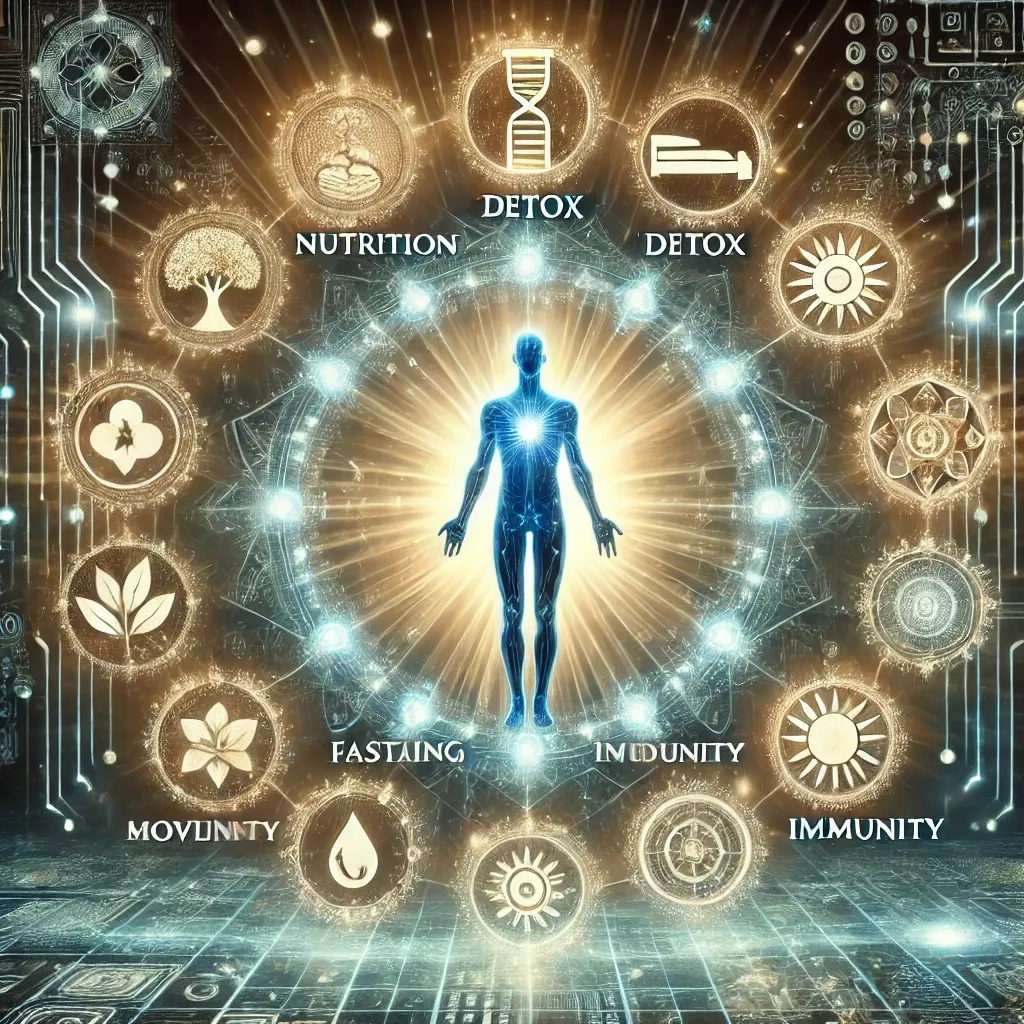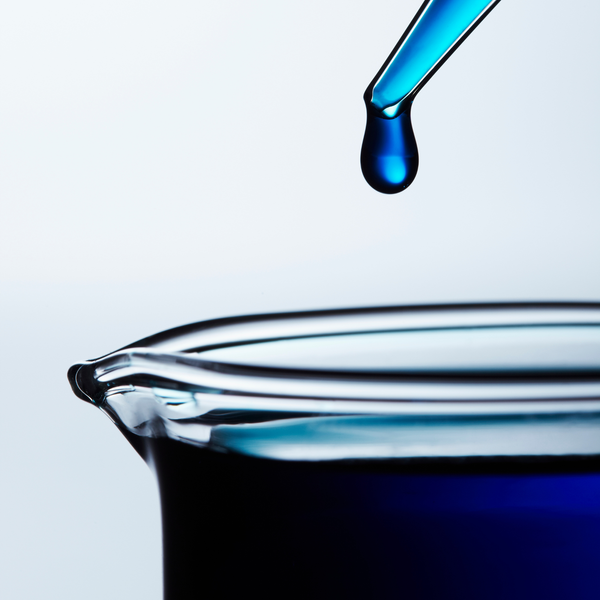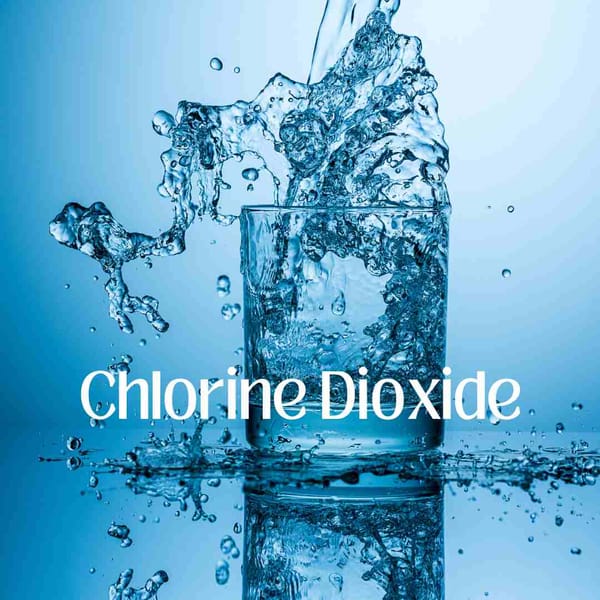Cheat Codes for Your Cells: Unlocking the Secrets to Cancer-Proofing Your Body

Introduction:
Why Wait for a Cure When You Can Prevent?
It sounds like the plot of a sci-fi thriller: young, healthy individuals facing a sudden spike in late-stage, aggressive cancers. But this isn't fiction. It's a growing reality that has researchers scratching their heads and looking at our lifestyles and possibly deeper causes. What if I told you that your body might already have the cheat codes to not just fight, but prevent these turbo cancers? Intrigued? You should be.
Today, we're diving deep into how you can activate your body's own superhero powers to shield yourself against the Big C. From the foods you eat to the air you breathe, every choice can be a step towards cancer-proofing your life. And no, this isn’t about popping a magical pill and calling it a day. It’s about a series of changes that could redefine your health narrative.
Nutrition: Your First Defense Line
Eat Your Way Out of the Cancer Ward
Why merely survive when you can thrive? Every bite you take can be a step toward fortifying your cellular army. Eating clean isn't just about avoiding junk food; it's about flooding your body with compounds that combat the cellular disruptions that can lead to cancer.
Cellular Defense Mechanisms:
- Detoxification: Foods rich in antioxidants, like berries and leafy greens, help neutralize harmful free radicals in the body, preventing oxidative stress that can damage cells and lead to mutations.
- DNA Repair and Protection: Nutrients like Vitamin C from citrus fruits and Vitamin E from nuts play crucial roles in protecting and repairing cellular DNA. This is vital in preventing the DNA damage that could potentially lead to cancer.
- Immune System Support: A strong immune system can detect and destroy abnormal cells. Foods high in zinc, such as pumpkin seeds and legumes, enhance immune surveillance and response.
By choosing meals packed with these nutrients, you’re not just feeding your body; you’re teaching it to defend itself against diseases, including cancer. It's a proactive approach to health that empowers your cellular systems to act before potential threats become real problems.
💧 Hydration & Detoxification:
If You're Not Flushing It Out… You're Storing It In
Let’s be real: if your body can’t get rid of toxins efficiently, you’re basically giving them permission to stick around and cause chaos. And when toxins linger, they don’t just mess with your energy or digestion—they quietly disrupt your hormones, burden your liver, damage your cells, and set the stage for cancer.
Why Hydration Matters So Much
Water is your body’s internal rinse cycle. It helps:
- Transport toxins out of your cells
- Move waste through your kidneys and bowels
- Keep lymphatic fluid flowing (your immune system’s drainage network)
- Protect and repair DNA
Even mild dehydration slows this system down and increases your toxic load. Not ideal when cancer thrives in toxic, inflamed environments.
How Much Water Do You Need?
Forget the “8 cups a day” rule. Try this instead:
Drink half your body weight in ounces of clean, filtered water.
(So if you weigh 160 lbs, aim for 80 oz/day.)
And no, your coffee doesn’t count. 😉
Easy Hydration Boosters:
- Start your morning with a glass of filtered water + a pinch of sea salt or squeeze of lemon
- Sip consistently—don’t guzzle
- Use a stainless steel or glass bottle, not plastic
- Avoid tap water when possible (it often contains chlorine, fluoride, and trace pharmaceuticals)
Detox Strategies That Actually Make a Difference
You don’t need a fancy juice cleanse to “detox.” Your body is already equipped with brilliant detox systems—it just needs the right support.
1. Eat Real Food
Whole, unprocessed foods (especially cruciferous vegetables like broccoli and cabbage) contain compounds that activate your liver’s detox enzymes.
2. Poop Daily
Yep, we’re going there. If your bowels aren’t moving, toxins get reabsorbed. Aim for 1-2 healthy bowel movements per day, and increase fiber + water if you’re not there yet.
3. Sweat it Out
Your skin is a detox organ! Use:
- Exercise
- Infrared sauna
- Hot baths with Epsom salt
All great ways to mobilize toxins and clear them through your sweat.
4. Support Your Liver
Your liver is the CEO of detox. Help it out by avoiding alcohol, minimizing medications, and loading up on:
- Bitter greens
- Beets
- Milk thistle tea or supplements
- Lemon water
5. Move Your Lymph
Lymph doesn’t have a pump—it depends on YOU to move.
Try:
- Dry brushing before showers (always brush toward the heart)
- Walking, rebounding, or stretching daily
👇 Supplements That May Support Detox
There are some natural compounds that can support your detox pathways when used appropriately—especially if you're dealing with heavy toxin exposure, mold, or post-illness fatigue. Some of the most researched options include:
- Glutathione – Your body’s master antioxidant that helps neutralize toxins
- NAC (N-acetylcysteine) – Helps boost glutathione and supports liver detox
- Milk Thistle – Known for liver support and cell repair
- Activated Charcoal or Binders – Used to "trap" and escort toxins out of the body
- Chlorella – A green algae that may help bind to heavy metals
- B-complex vitamins – Essential for phase 1 and 2 liver detox enzymes
👉 These can be powerful, but they aren’t one-size-fits-all.
If you're ready to learn how to use these supplements effectively, avoid common detox mistakes, and get monthly guidance on advanced strategies to reduce your toxic load and prevent cancer—join the second tier of this blog.
Each month we go deeper into topics like this, break down what the science really says, and help you build your own cancer defense blueprint—one step at a time.
💤 Sleep Like Your Life Depends On It (Because It Kinda Does)
Let’s cut to it—if you’re skimping on sleep, you’re sabotaging your body’s ability to fight disease. You might be able to fake it through a busy Monday with a triple espresso, but your immune system, hormones, and cellular repair systems don’t bounce back quite as easily.
And when it comes to cancer? Chronic sleep deprivation is like rolling out the red carpet for it.
What Happens When You Sleep?
Sleep isn’t just “rest time.” It’s biological repair mode.
Here’s what your body gets done while you’re catching zzz’s:
- Your immune system resets and produces more natural killer (NK) cells—aka the tiny assassins that seek out and destroy abnormal or cancerous cells.
- Your brain flushes out toxins through the glymphatic system, reducing inflammation and oxidative stress.
- Melatonin, your sleep hormone, doesn’t just make you drowsy—it’s also a powerful antioxidant that may help inhibit cancer cell growth.
- DNA repair ramps up, and damaged cells get flagged for cleanup or replacement.
Cut sleep short, and these processes don’t happen like they should. Over time, that can lead to DNA damage, higher inflammation, hormonal imbalance, and a weakened immune response—all of which open the door for chronic illness and cancer to take root.
Quick Tips to Upgrade Your Sleep Game:
- Stick to a schedule – Go to bed and wake up at the same time every day (yes, even weekends).
- Darken your bedroom – Use blackout curtains, cover LED lights, and ditch your phone before bed. Light = melatonin killer.
- Avoid late-night eating – Give your digestive system a break so your body can prioritize repair, not digestion.
- Keep it cool – Aim for a bedroom temp around 65°F (your body sleeps best when it’s slightly cool).
- Get morning sunlight – Natural light first thing in the morning helps regulate your circadian rhythm and boosts daytime energy.
🏃♀️ Movement Is Medicine (Yes, Even for Cancer)
Here’s the thing: exercise isn’t just about weight loss or fitting into your favorite jeans. When you move your body intentionally and consistently, you’re tapping into one of the most powerful cancer prevention tools available.
Yep—lacing up your sneakers could literally save your life.
💥 What Happens When You Move?
Every time you engage in physical activity—whether it’s a brisk walk, dancing in your kitchen, or hitting the gym—you’re doing way more than burning calories.
You're:
- Increasing circulation, which means more oxygen and nutrients reach your cells and more toxins get flushed out.
- Stimulating the lymphatic system, which doesn’t have a pump of its own. Movement is what keeps your body’s “trash removal system” working efficiently.
- Regulating blood sugar and insulin, which is key because high insulin levels have been linked to increased cancer risk.
- Reducing inflammation, which is a root contributor to nearly every chronic disease, including—you guessed it—cancer.
- Boosting immune surveillance, making it easier for your body to detect and destroy abnormal or cancerous cells before they multiply.
🤔 How Much Movement Are We Talkin'?
You don’t need to train like an Olympian. But you do need consistency.
Here’s a simple baseline:
- Aim for 30 minutes of movement at least 5 days a week.
- This could be walking, yoga, biking, swimming, weight training, or chasing your dog around the yard.
- Sprinkle in short bursts of higher intensity (like climbing stairs or squats during commercials) a few times a week if you're able.
🧘♀️ What Counts?
Basically: if you’re off the couch and getting your heart rate up, it counts.
But don’t discount the power of:
- Gentle stretching to increase circulation
- Rebounding (mini-trampoline) to stimulate the lymph system
- Yoga or tai chi to reduce stress and inflammation
- Outdoor movement (sunlight + grounding = bonus detox and immune perks)
You don’t need a fancy gym or the “perfect” routine. The best movement is the one you actually enjoy and will do. Every single time you move, you’re helping your body stay oxygenated, detoxed, and cancer-resistant.
🧴 Living Less Toxic in a World That’s Basically a Chemical Soup
Here’s the harsh truth: we’re swimming in toxins every day. From the stuff in our shampoo to what’s lurking in our water, the modern world is loaded with chemicals that can mess with our hormones, suppress our immune systems, and yes—raise our cancer risk.
You don’t have to live in a bubble, but you do need to be intentional.
☠️ Everyday Toxins That Could Be Sabotaging Your Health
Some of the most common offenders you’re likely exposed to daily include:
- Pesticides – Found in non-organic produce and even in your lawn care products.
- Plastics (like BPA & phthalates) – Lurking in food packaging, water bottles, and receipts.
- Fragrance – A sneaky term for hormone-disrupting chemicals in everything from candles to lotions.
- Heavy metals – Present in some tap water, makeup, and older household pipes.
- Household cleaners – Most mainstream brands contain VOCs and other respiratory irritants.
- Personal care products – Many include parabens, sulfates, and other known endocrine disruptors.
Now ask yourself: if you’re constantly absorbing, inhaling, and ingesting these things… how can your body focus on healing and preventing disease?
🧽 Small Changes That Make a Big Difference
You don’t have to overhaul your entire life overnight. Start small and swap where it counts:
- Go fragrance-free – Choose “unscented” or naturally scented products with essential oils.
- Use glass or stainless steel – For water bottles and food storage to avoid plastic leaching.
- Filter your water – A good filter (even a countertop one) can reduce heavy metals and chlorine.
- Buy organic when possible – Especially for the Dirty Dozen list of high-pesticide produce.
- Switch your cleaning products – Look for non-toxic, biodegradable brands—or make your own with vinegar and baking soda.
- Audit your personal care – Use the Think Dirty or EWG Skin Deep app to scan your go-tos.
🌱 Why It Matters for Cancer Prevention
Many of the chemicals mentioned above are carcinogenic or endocrine-disrupting, meaning they mess with your hormones—especially estrogen. This is a big deal when it comes to hormone-driven cancers like breast, ovarian, and prostate cancer.
Reducing your toxic load gives your liver a break, supports your immune system, and keeps your body’s natural detox pathways clear and functional.
🧠 The Mind-Body Connection: Your Thoughts Literally Shape Your Cells
You can eat all the kale, filter all the water, and sweat out every toxin—but if your mind is constantly spinning in stress mode, you’re still putting your body in a compromised state.
And no, this isn’t woo-woo. It’s real biology.
🧬 Chronic Stress = Chronic Inflammation
When you’re stressed, your body releases cortisol and adrenaline—great in the short term, terrible when they’re constantly elevated. Why? Because…
- Chronic stress suppresses immune function, including the very cells responsible for detecting and destroying abnormal or cancerous cells.
- It disrupts sleep, digestion, and hormone balance—three pillars of health.
- It keeps your nervous system in fight-or-flight mode, which shuts down repair processes and increases inflammation throughout your body.
Long-term stress can literally change your gene expression through epigenetic mechanisms—turning on disease-promoting pathways while turning off protective ones.
🧘♀️ Simple Practices That Make a Huge Difference
You don’t need to become a monk or sit in silence for hours. You just need intentional space to reset your nervous system.
Try weaving in any of these:
- Box breathing (inhale 4, hold 4, exhale 4, hold 4) for 2–5 minutes.
- Grounding—walking barefoot outside or using a grounding mat.
- Gentle movement like yoga, tai chi, or even stretching with music.
- Guided meditation apps like Insight Timer or Calm.
- Journaling to offload anxious thoughts and reframe your mindset.
- Laughter + community—seriously, joy is medicine.
🎵 Bonus: Frequency and Vibration
Emerging research is exploring how frequency-based therapies like binaural beats, tuning forks, and sound baths can support the parasympathetic nervous system. It’s early-stage, but it’s promising—and something to tuck in your wellness toolbox.
Your mind and your body aren’t just connected—they’re in constant conversation. Calming your mind is one of the most effective and overlooked strategies for lowering inflammation, supporting immunity, and creating an internal environment where cancer has a much harder time taking root.
🛡️ Boosting Immunity: Your Body’s Built-In Cancer Defense Squad
Think of your immune system like a highly trained security team, constantly patrolling your body, scanning for threats—including abnormal cells that could become cancer.
When your immune system is sharp, those rogue cells get spotted and destroyed before they become a problem. But when it's overwhelmed, distracted, or suppressed? That’s when things slip through the cracks.
Let’s keep that system armed and ready.
🧬 How Immunity and Cancer Prevention Are Connected
Your immune system does more than fight off colds—it’s your first and last line of defense against chronic illness, especially cancer. Specialized immune cells like natural killer (NK) cells, T-cells, and macrophages are constantly scanning for damaged or mutated cells that don’t belong.
When your immune function is strong:
- Abnormal cells get identified and removed quickly
- Inflammation is kept in check
- Cellular repair systems work efficiently
When your immune function is weak:
- Inflammation lingers and feeds tumor development
- DNA repair slows down
- Cancerous cells may grow undetected
🥦 Everyday Habits That Strengthen Immunity Naturally
Here are simple things you can do today that make a massive difference over time:
- Eat the rainbow – Colorful fruits and veggies are loaded with antioxidants that neutralize free radicals and reduce cellular damage.
- Sleep like it’s your job – Poor sleep decreases NK cell activity and weakens immune responses.
- Move your body – Moderate exercise boosts immune circulation and reduces inflammation.
- Manage stress – Chronic stress suppresses the immune system; even 10 minutes of deep breathing can help.
- Get some sun – Just 15 minutes of sunlight helps produce Vitamin D, which plays a key role in immune regulation.
💊 Immune-Supporting Supplements (No Dosage Guidance Here)
There are several supplements being studied for their potential role in enhancing immune function and supporting the body’s natural ability to eliminate abnormal cells:
- Vitamin C – Supports white blood cell function and reduces oxidative stress.
- Vitamin D3 – Regulates immune response and may reduce cancer risk when levels are optimized.
- Zinc – Essential for proper immune cell signaling and function.
- Medicinal mushrooms (like Reishi, Turkey Tail, Lion's Mane) – Known to activate immune cells and modulate inflammation.
- Melatonin – More than a sleep aid, it has immune-boosting and anti-cancer properties. High dosages a if you have a cancer diagnosis.
- Quercetin – Acts as an antioxidant and helps regulate immune response.
- Probiotics – Gut health and immunity are directly connected; diverse, healthy flora is key.
A strong immune system isn’t a luxury—it’s a necessity. And the good news? You have way more control over its strength than you’ve been led to believe.
🔚 Wrapping It Up: Your Health Isn’t Just in Your Genes—It’s in Your Hands
If there's one thing I hope you're walking away with, it's this:
You are not powerless.
Your body is brilliantly designed to detect, destroy, and detoxify. Cancer doesn’t just "happen" overnight. It’s a slow, cumulative process fueled by inflammation, toxicity, poor cellular repair, and immune dysfunction. But here’s the empowering part—you can influence every single one of those systems with intentional daily choices.
And while this blog gave you a solid overview, it's truly just the beginning.
💡 Want to Go Deeper?
If you’re ready to take your knowledge and action to the next level—welcome to Tier 2.
Inside the Prevention Files, we go beyond the basics and deep dive into what it really takes to create a body that’s hostile to cancer (and other chronic disease). Month by month, I’ll break down:
- Advanced detox strategies and protocols
- Supplement guides with usage insights and cautions
- The science behind terrain theory, mitochondrial health, and biological terrain optimization
- Tools for supporting real immune resilience—not just "boosting" it
- Foundational practices for becoming the most robust, resilient version of yourself
All of this is designed to help you prevent what’s preventable, repair what’s been damaged, and build a body that functions the way nature intended.
You don’t need to fear disease when you understand your biology—and how to work with it, not against it.
Let’s get to work.
🔒 Upgrade to Tier 2 and join The Prevention Files
In health,
Jamie Shahan MSN, CRNA, RN
Empowering Holistic Health
🌐 Connect with me on Social Media:
This article contains affiliate links and I may make a little cash along the way. I'd be stupid not to add them! If I am educating you about making changes then I may as well recommend items for you to try. These suggestions will get you looking in the right direction.
Disclaimer
I am a healthcare practitioner. I am not a doctor, nor am I your healthcare practitioner. The information shared in this blog is for educational and informational purposes only and is not intended as medical advice, diagnosis, or treatment.
I explore and share research, holistic approaches, and personal experiences in my journey to healing. It is up to you to make informed decisions about your health. Always do your own research, listen to your body, and consult a trusted healthcare professional if needed before trying any new health protocol, supplement, or treatment.
By reading this blog, you acknowledge that you are responsible for your own health choices and that I am not liable for any outcomes resulting from the application of the information provided.



